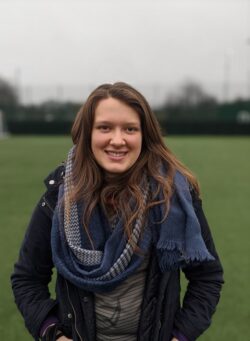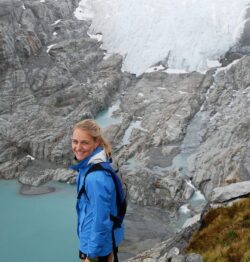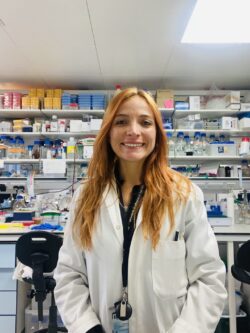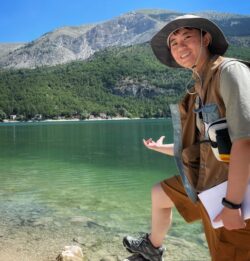SPRING Award winners 2023
We are delighted to announce our latest SPRING award winners.
The SPRING competition is a funding award which is part of water@leeds’ Mission 4: Next Generation – to train the next generation of water experts who will develop the knowledge, skills and interdisciplinary awareness to make a positive contribution to tackling water-related challenges. The award is open to all postgraduate research students whose research is related to water.
In this round of the award, we received fourteen diverse applications from PhD candidates across five schools, and our funding support goes to seven postgraduate researchers for their excellent applications which reflect the wide ranging international and interdisciplinary research taking place at water@leeds with global impact.
We would like to thank our Associate Director Dr Adam Booth for his work in communicating and co-ordinating these awards and to Prof Vasilis Sarhosis, School of Civil Engineering International Lead and Prof William Murphy Faculty of Environment, Pro Dean International for the additional funding support.
Many congratulations to our seven awardees!

Christopher Walker, School of Civil Engineering
PhD title: The impact of climate change on geostructures with particular reference to transport infrastructure
Present and future engineering problems associated with transport infrastructure geostructures (embankments and cuttings) require an understanding of the interaction between compacted soil and water. Extreme weather attributed to climate change will result in intensified climatic events and seasonal extremes. This results in persistent moisture changes that are caused by both infiltration (wetting) and evaporation (drying).
Chris will use his SPRING funding to conduct experiments on the application of three drying and wetting cycles simulating infiltration and evaporation of water will then allow for the formation and development of cracking to be linked to soil behaviour. The unique findings will provide insight required for asset risk management to increase geostructures lifespan.

Francesca Morris, School of Earth and Environment
PhD title: Interactions between mesoscale organised convection and large-scale circulation in West Africa.
In West Africa, huge thunderstorms called mesoscale convective systems (MCSs) dominate the weather, contributing to up to 90% of the rainfall that falls in the Sahel during the summer. Forecasting MCSs is crucial to the livelihoods of the tens of millions of people who live in Africa, but weather forecasting models struggle to predict where MCSs form, how long they last, and how intense their rainfall is.
Francesca is using the SPRING funding to develop skills in taking measurements of weather conditions, including moisture, snow, and rainfall to support her research. She will use the funding to attend a Field Electronics training course run by the Centre for Ecology and Hydrology (CEH) in Wallingford.

Johan Pasos Panqueva, School of Civil Engineering
PhD title: Sustainable aquaculture production systems through nutrient recycling from fish farming effluents using duckweed
Changes in consumption habits induced by the continuous increase of global population and raise of household income are creating pressures on water security and food supply systems. As a result, aquaculture sector has become a focus of attention as it provides healthier options to meat products at affordable prices. However, its higher-than-average growth is creating negative impacts to aquatic ecosystems. Sustainable solutions like the use of aquatic plants (e.g., duckweed) for nutrient control and recovery from fish farm effluents have been studied over years, but the mechanisms governing nutrient uptake and accumulation are still unknown.
Johan will use the SPRING funding to support his experiments on the implementation of a pilot system and with the analysis of the samples taken from it, it will be possible to refine the numerical model used for the simulation of duckweed-based systems for the recovery of nutrients from wastewater.

Nicola Kerr, School of Geography
PhD title: How river ecosystems respond to glacier retreat at broad biogeographic scales.
Glaciers are retreating at unprecedented rates, changing river physical/chemical properties, threatening biodiversity and altering ecosystem processes. The geographic isolation of alpine/polar ecosystems and cryosphere sensitivity to warming, makes glacier-fed rivers vital indicators of hydrological and ecological shifts induced by climate change. Benthic biofilms in glacial rivers are central to biogeochemical processes of nutrient cycling and primary production and diatoms (algae) are the primary energy source as terrestrial organic matter input is limited above the treeline. However, research into the effects of decreasing glacier cover on river biofilms remains scarce.
Nicola's PhD aims to fill this gap by examining responses of river biofilms to glacier loss. The SPRING funding will support Nicola to facilitate further learning of genomic techniques for use in ecological studies, and she will use the funds to support laboratory work on the utilisation of DNA for identifying animal and plant communities in ecosystems.

Laura Tatiana Burgos, School of Civil Engineering
PhD title: Cell machinery manipulation for luxury phosphorus recovery by Chlamydomonas reinhardtii from wastewater
Tatiana believes that the development of bioresource recovery techniques is the go forward path towards sustainable development, giving an added value to what we call waste. Phosphorus is an absolutely vital nutrient for all living organisms, which human beings rely on to produce nutritious food. Its unsustainable mining from land has caused this cycle to be broken, threatening food security. Ironically, vast amounts of this nutrient are loaded to water streams, causing degradation of aquatic ecosystems, thus affecting water security. Microalgae can help to close the phosphorus cycle by recovering phosphorus from wastewater and generating phosphorus rich biomass that can be further used as a biofertiliser, thus contributing to food and water security.
Tatiana is currently studying the dynamics of phosphorus uptake by microalgae, and is conducting a number of experiments. The results are looking promising and Tatiana will be using the SPRING funding to buy the consumables that will support her last set of experiments before writing up her thesis.

Hang Wu, School of Civil Engineering
Awarded through School of Civil Engineering International Development Funding
PhD title: Multi-hazard assessment of landslide-dams and their impacts on flooding risk on a global scale.
Landslide dams occur when the mass of a landslide, or several landslides, from the adjacent hillslopes, partially or completely blocks the normal fluvial (river) channels. It is a hazard occurs at the intersection between hillslopes and fluvial systems. Landslide dams frequently occur in mountainous areas where tributaries and headwater basins are located. Even though landslide dams have been reported around the world, this research area is relatively new compared to traditional landslide studies or flood studies.
Hang Wu will use her funding to support a research visit in Japan and allow her to visit Tokyo University and meet some of the researchers who have been instrumental in producing some of the key global fluvial datasets. The funding has provided Hang with a key opportunity to learn from other experts, exchange ideas related to floods and multi-hazards, such as landslide dams, and network with other professionals.

Rosie Lewis, School of Earth and Environment.
Awarded through Faculty of Earth and Environment, Pro Dean International
PhD title: Assessing the health hazards of chronic exposures to volcanic gases on Montserrat, Eastern Caribbean
Volcanoes can be a prodigious source of gases and aerosol particulate matter which can impact air quality and rainwater composition on local and regional scales. The Montserrat government has expressed concerns that its citizens and visitors are chronically exposed to volcanic air pollutants as the Soufrière Hills volcano continues to degas. Residents report odours of sulphurous gases, whilst measurements taken by the Montserrat Volcano Observatory (MVO) indicate that the volcano is emitting up to 1000 tonnes per day of sulphur dioxide (SO2). Parts of the Montserratian community, as in many tropical countries, source their drinking water from rain catchment; therefore air pollution hazards are directly related to water pollution health hazards. Rosie will conduct the first detailed assessment of the concentrations and dispersion of volcanic pollution on Montserrat, to advise local agencies (e.g. MVO, Ministry of Health) on human health risks.
Rosie will use SPRING funding to support an essential first stage of her fieldwork on Montserrat: calibration of 10 lower-cost sensors against 2 reference-grade instruments under local humidity (and volcanic) conditions. It will allow essential data collection for quality assurance and control, which is vital to the success of her study.
